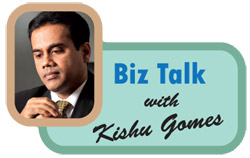
Flexibility, vital to face the unexpected
Your results are determined by the way you manage yourself
internally. This principle is true for business organisations too. We
have our inherent dominant ways to respond to different people and
situations.
For business organisations, decision-making is an essential component
of leadership.
Leaders must not be hesitant to take a flexible or reversible
position when there is uncertainty about the future. This allows
opportunity for changing the course of action as those making decisions
receive more information over time. Inner flexibility is needed for
people to adapt to varying situations for uninterrupted performance.
Some may argue that flexibility connotes lack of confidence or poor
planning but the fact remains that there is nothing static about the
world. Everything keeps evolving and the flexibility discussed here is
all about aligning your thoughts or strategy to stay relevant and
meaningful.
Positives
Your approach to situations is determined by your internal world -
your attitude, beliefs, thinking, assumptions and emotional state. If
you change one of these, you will change how you perceive and deal with
a situation.
For instance, if you have too much work pressure, you may see only
the negative aspects - you may be frustrated because you assume that it
is not negotiable. Instead, decide which aspect of your approach is the
easiest to change. You could focus on the positives, assume you can
renegotiate or feel motivated instead of feeling frustrated.
Beliefs
Develop the flexibility to handle situations at work by changing
aspects of your feelings, beliefs and thoughts.
When you are in a difficult situation, first, check your emotional
state and if necessary, work on improving it.
For example, think of a past situation in which you did feel positive
and imagine being back in it for a few seconds.
Second, check your assumptions. Is what you are assuming true? Third,
check your thinking. Is there a way of thinking about the situation that
works better than your present approach?
Priorities
Business response to change often needs adjusting your approach to
meet the unexpected. Keeping an open mind is important when considering
the overall situation and its dynamics.
To build flexibility in decision-making you need to be receptive to
change - change to be still relevant. Even the best-laid plans hit
unanticipated turbulence which we experience more frequently now.
The key is to know when to adjust your approach. Effective
decision-makers shift priorities as the need arises and show a
willingness to achieve objectives by taking advantage of new
opportunities.
Top performers develop the mental flexibility to generate
high-quality options so that they can at the end pick the best one.
Think through possible approaches until you have difficulties, ask
yourself, 'what is the best way to view this situation?'
Develop flexibility by thinking of different approaches to
situations. Examine your thoughts, moods and assumptions and look at
what you could change to achieve better results. |

